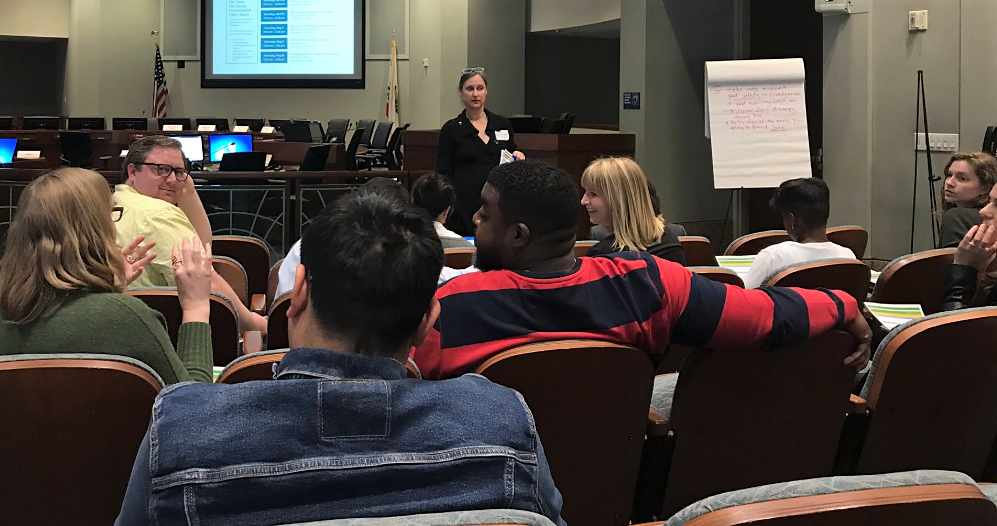The LA County Chief Sustainability Office and UCLA convened nonprofit, public, and private sector leaders across Los Angeles county to review and provide input on the Discussion Draft of OurCounty, the Los Angeles Countywide Sustainability Plan.

Two identical Draft Review Sessions were held on April 24, 2019 at Metro Headquarters in Downtown Los Angeles and on April 30, 2019 at the Carson Community Center in Carson, CA, respectively. In total, both Draft Review Sessions convened 155 stakeholders and leaders representing 115 organizations across all sectors, such as government officials, nonprofit administrators, business representatives, and community leaders.
The Discussion Draft of the LA County Sustainability Plan is organized by 12 overarching sustainability goals. Each Goal contains a set of Strategies related to that goal, Actions that detail specific actions LA County can take to achieve the strategy, and quantitative Targets at the Strategy level to track progress. Stakeholders participated throughout the three and a half-hour workshop in various breakout sessions that allowed them to review the Goals, Strategies, Actions, and Targets of the Discussion Draft, share key feedback, and offer suggestions towards implementation.
This summary report (see hyperlink below) is a compilation and synthesis of nearly 1,200 comments that the stakeholder engagement team was able to capture through digital polling, facilitator notes, typed transcription, and participant comments.
This report also reflects feedback written by stakeholders through comment letters, submitted through an interactive online version of the Plan. The full extent of comments will be provided in a separate document, but key takeaways from comment letters relating to the discussions shared at the Draft Review Sessions are incorporated here:
Key Takeaways
- Support for housing affordability is at the center of nearly every topic area discussion, especially transportation, infrastructure, and parks. Stakeholders feel strongly that reducing vehicle miles traveled (VMT), increasing density around transit hubs, and implementing zoning that ensures walkability are necessary strategies that must be implemented in such a way that they support affordable housing, the most pressing social need in Los Angeles. This includes ensuring disproportionate costs for household utilities and residential services such as water, energy, and waste are not borne by renters and low-income residents.
- Stakeholders believe that engagement should be an ongoing process that LA County should continue past plan adoption and through implementation. Participants understand that implementation of these many actions will require enormous leveraging of grassroots networks, community involvement, and strategic champions. There is strong desire for quarterly communication and updates, and additional in-person opportunities for leaders to convene. People recognize the region’s vast array of cities, communities, and needs as both a strength and a challenge. Many suggestions were made to include key nonprofits as partners within the Plan itself. Participants want LA County to directly empower stakeholders to take the lead by providing funding, education, and policy adoption.
- “Leading by example” is one of the County’s best tools for ensuring sustainability. Stakeholders praised actions such as a Good Food Purchasing Policy, prompting further discussion that this type of policy should be a model for holistic purchasing for all County procurement needs. Stakeholders want to see the County do business with companies that prioritize workers’ rights, support community objectives, and operate with as little environmental harm as possible.
- The County needs a clearer policy framework for how it plans to invest in the education of residents, workers, and its own employees, which stakeholders view as a key gap that must be addressed to achieve sustainable outcomes. Many suggestions were made around partnerships that the County should be supporting to increase awareness of and education on sustainability issues, including climate scientists, community-based organizations, and indigenous peoples. Some participants argued that the County should take an even more proactive role, acting as a clearinghouse for information on sustainability education initiatives. Participants identified workforce training as a top priority to effectively transition towards a cleaner economy, build new workforce skills, and earn workers’ trust. Some also recommended for the County to utilize the expertise of sustainability experts who can work with County departments to interpret data, inform staff, and help make policy recommendations.
- Most goals in the Plan can only be met by creating a fossil fuel-free LA County. Participants felt some Actions need to be stronger in order to meet this goal, such as those that set new requirements for County buildings only of a certain size and those that refer to natural gas. Many shared that true implementation of a fossil fuel-free county would alleviate incompatible and polluting land use issues. Stakeholders want stronger targets around setbacks and sensitive uses that focus on eliminating polluting sources that cause harm.
Comments on the key recommendations can be directed to sustainability@lacounty.gov.
Read more in the Draft Review Sessions Summary Report
Download the Draft Review Sessions Presentation
Download the Discussion Draft
